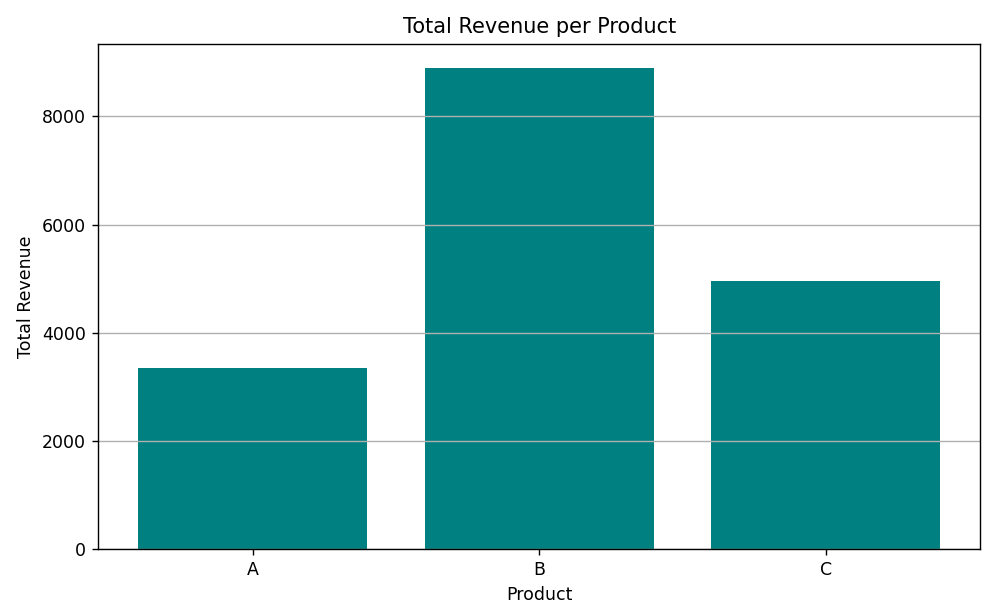
groupby() and agg() in pandas to compute total sales and revenue per product, and then visualize it with a bar chart.First, we create a DataFrame using sample sales and revenue data for different products.
Then, we use groupby() to group the data by the product name.
After grouping, we use .agg() to calculate the total sales and total revenue for each product.
This gives us a summary table showing total sales and revenue for products A, B, and C.
We then use matplotlib to create a bar chart to show the total revenue per product.
The chart helps us compare which product made the most revenue overall.
This method is very useful when working with large data that needs to be summarized before visualizing.
Program:
import pandas as pd
import matplotlib.pyplot as plt
# Sample transactional data
data = {
'Product': ['A', 'B', 'A', 'C', 'B', 'C', 'A', 'B', 'C'],
'Sales': [100, 200, 150, 100, 250, 200, 130, 220, 180],
'Revenue': [1000, 3000, 1200, 900, 3100, 2100, 1150, 2800, 1950]
}
df = pd.DataFrame(data)
# Grouping by product and aggregating
grouped = df.groupby('Product').agg({
'Sales': 'sum',
'Revenue': 'sum'
}).reset_index()
# Plotting total revenue per product
plt.figure(figsize=(8, 5))
plt.bar(grouped['Product'], grouped['Revenue'], color='teal')
# Formatting
plt.title('Total Revenue per Product')
plt.xlabel('Product')
plt.ylabel('Total Revenue')
plt.grid(axis='y')
plt.tight_layout()
# Show the plot
plt.show()
Output:


Trainings :
UI UX Design Training in Indore | DevOps Training in Indore | Python + DSA Training in Indore | Python and Django Training in Indore | Full Stack Development Training in Indore | Data Analytics Training in Indore | Data Science Training in Indore | Web Development Training in Indore |Free Courses and Resource :
Verbal Aptitude | Matplotlib Tutorials | Examples | Interview Questions | Pandas Tutorials | Projects | Interview Questions | OpenCV Tutorials | Projects | Interview Questions | ExpressJS Tutorials | Projects | Interview Questions | Dart | Python Data Structures and Algorithms | Rust Tutorials | Projects | Interview Questions | Aptitude Tests | HackerRank Python | Django | MongoDB Tutorials | Examples | Interview Questions | NumPy Practice Questions | Python Tutorials by CodersDaily | Golang Tutorials | Projects | Interview Questions | React.js Tutorials | Verbal Ability Tutorial | MS Sql Server Tutorials | Examples | Interview Questions | Power BI Tutorials | Projects | Interview Questions | Example Dashboards | Numpy Tutorials | Projects | Interview Questions | Django REST Framework Tutorial | HackerRank C++ Solutions | Pandas Practice Questions | Tensor Flow | Python Practice Questions | C++ Tutorials | Quantitative Ability Tutorial | Google Sheets Mastery: From Basics to Dashboards | Langchain Tutorials | Javascript | Node.js Tutorials | HackerRank SQL Solutions | HackerRank DSA Solutions | Verbal Aptitude 2 | HackerRank Java Solutions | HTML Tutorial | TCS NQT Mock Test Series | Reasoning Ability Tutorial | CodeChef Python Solutions | HackerRank C Program Solutions | Leetcode Python Solutions | SQL Practice Question | Matplotlib Practice Questions |Interview Questions :
Pandas Tutorials | Projects | Interview Questions | ExpressJS Tutorials | Projects | Interview Questions | Django | Python Tutorials by CodersDaily | Golang Tutorials | Projects | Interview Questions | Numpy Tutorials | Projects | Interview Questions | Django REST Framework Tutorial | Matplotlib Practice Questions | Matplotlib Practice Questions | Matplotlib Practice Questions | Matplotlib Practice Questions | Matplotlib Practice Questions | Matplotlib Practice Questions | Matplotlib Practice Questions | Matplotlib Practice Questions | Matplotlib Practice Questions | Matplotlib Practice Questions |Top Colleges in India :
Indian Institute of Technology Bombay | Jaypee University of Engineering and Technology - Guna |